There’s a general misconception that every hunt should end in a successful kill shot. After all, people rarely post about their unsuccessful hunts or share photos of returning to camp empty handed.
Nobody enjoys failure, especially when it comes to hunting. But hunting success should never be measured by kills alone. Sometimes there’s just as much to be learned from coming home empty-handed.
About a year ago, I made the decision to become a hunter – at the ripe old age of 45! I have been surrounded by hunters for years, but it wasn’t until I accompanied my family on a hunting trip to New Zealand that I really got bitten by the bug myself. You can read about why I decided to become a hunter here.
This story, however, is about my first hunt, which took place in South Africa.
My first attempt at hunting was on a property in Limpopo in the north of the country. While I had a few days to mentally prepare for my first hunt, I’d only ever shot a firearm at the range under completely controlled conditions, so when it came time to head out, my mind was racing with a million different questions!
What steps did I need to take? What gun would I be using, and how did that differ from the one firearm I’d actually had any success with? What about shot placement? I’d heard it differed depending on the animal, and I still wasn’t sure what animal species I was going after. What if I missed? Or worse, what if I hit the animal but only injured it? What if I hated hunting? What if I made an absolute fool out of myself?
Yeah, I know. I think way too much.
We arrived on the hunting concession and within a few minutes, our guide had spotted a herd of impala off in the distance. He leaped out of the vehicle, indicating me to follow.
He scurried off towards the herd, my short legs following as fast as I could, rifle in hand.
Next thing I know, the shooting sticks are up and he’s pointing out the animal I was supposed to take aim at.
Wait? What?
I wasn’t mentally ready. I still had so many questions. My mind was speeding through all the ‘what ifs’ and my hands actually started shaking.
I’d never shot off sticks before, so that was a completely new experience. I took aim, putting the crosshairs where I thought the heart would be, and pulled the trigger.
Boom!
I looked up, expecting to see an animal on the ground. All I saw was a herd of impala racing off through the trees.
Next, we came across a herd of springbok and I repeated the process, racing through the dry scrub to follow Niels, taking aim and missing completely.
Unused to the rush of adrenaline, I kept pulling the trigger rather than squeezing it, which meant that every time, my shot went astray. No idea whether I was shooting high or low or too far to the left but the only thing I bagged myself that day was a couple of trophy trees!
If I was being honest with myself, I was also out of my comfort zone. I was so unsure of myself, and I felt stupid admitting how little I actually knew about the process of hunting.
By the time the sun set and we had to pack it in for the day, I was glad to hand the rifle back, and had almost convinced myself I wasn’t cut out for hunting.
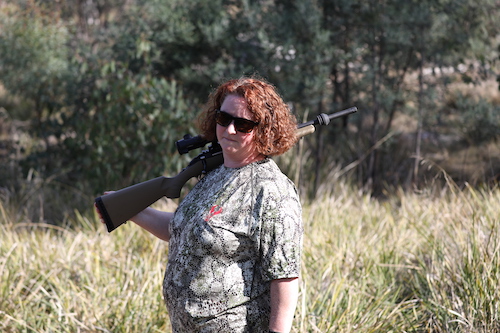
After that, I started making excuses for why I didn’t want to hunt. I was too tired, we needed to focus on the rest of the group getting their animals, I had a headache, I had to babysit… But in truth, I was scared of making a fool of myself – or worse, of actually hitting an animal and just injuring it.
A few days later, we left Limpopo and travelled down to the Free State where I continued my procrastination.
On our second last day, our long-term friend and guide, Willem asked me what was wrong and I finally shared my concerns. He convinced me to give it another go, promising me he’d walk me through the process slowly and not rush the experience.
Convinced, we headed out the next morning, making the decision to go after a herd of waterbuck. We tracked them on foot across the plains, hiding out behind trees and bushes as they moved closer to us, backtracking and heading in another direction when they spotted us and took off.
It was slower and more methodical than my first attempt, and I felt a lot more at ease. We sat around for long periods of time, waiting for the herd to move towards us. That meant I had plenty of time to watch the herd’s behaviour, to study their bodies and picture in my mind where I would place the shot. I also got a great feel for how hard it is to get close to a herd of animals. There are dozens of eyes watching your every move, reacting to anything that is out of the ordinary. They can smell you long before you even know they’re there. And they pretty much have super-hero hearing. Anyone that thinks hunting is easy has obviously never tried to get up close to a wild animal without being seen.
We waited behind a clump of bushes as the herd moved slowly towards us. Willem set up the shooting stick. This time, I felt I had time to relax, to breathe deeply and think about how and where I would place my shot. Willem talked me through shot placement, telling me exactly where on the animal I should aim.
The herd got within 60 yards of us, and Willem pointed out one of the bigger bucks. I nodded, getting him in my sights. It was my first time shooting with the ATN scope and the set up was completely different to the Vortex scope I’d previously used. But I focused beyond the scope to the animal in the crosshairs, placing the lines on the waterbuck’s front shoulder, confident I could actually do this.
I chambered a bullet, switching the safety off as I moved my finger to the trigger. But before I could squeeze, two females ran in front of the buck, obscuring my shot. By the time they moved, the buck had disappeared behind some thick shrubs. By the time we moved position, they’d caught our scent and took off running.
Gun back in safe mode, we set off tracking the herd again, following them for another hour or so. But they stayed just tantalisingly out of our range. The closest we got was 150 yards and I didn’t have a clear shot.
The longest distance I’d ever shot was 100 yards, and that was in a totally controlled environment –my target a static bisalloy plate and my rifle completely stable on a solid shooting bench.
By the time the buck stopped again and I got the ATN crosshairs on his front shoulder, he was sitting at 180 yards – not an impossible shot, but not an easy one for a complete beginner without a single kill under her belt.
Boom!
The rifle recoiled into my shoulder and the herd took off – the buck I had been aiming at included – completely unharmed and unfazed.
I’m not exactly certain what I did wrong. Did I pull the trigger again, rather than squeeze? Did I shut my eyes? Was the distance just too great? Or was the rifle really shooting off? I know a hunter is not supposed to blame their tools, but everyone who had shot with that rifle so far had complained that it wasn’t shooting the way it should be.
Having left things so late, I didn’t get another chance to hunt – and Tash ended up dropping my buck later that afternoon.
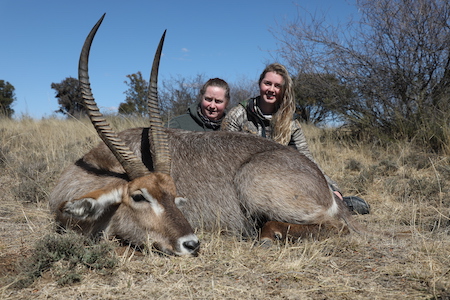
But I actually learned a lot more from that unsuccessful hunt than I think I would have learned had I been successful and bagged myself a trophy water buck.
For starters, I am a firm believer that there should be a natural progression to hunting. Learn the basics, start small, and then work your way up the hunting ladder.
Had I been successful, I feel I would have skipped some pretty vital steps in my ‘learn to hunt’ journey. It would have been like winning a Gold Medal at the Olympics without doing any of the training or preparation that goes into being an elite athlete. You can’t go from complete novice to the winners’ podium without putting in some hard work.
There’s an old saying – practice makes perfect. I’d literally gone from shooting a rifle a handful of times at a stationary target to thinking I was good enough to hunt a wild animal. And as I learned very fast, shooting at the range is completely different from shooting in the field.
It reminded me of a scene from the movie Glory where the trainee soldier thinks he’s the bee’s knees because he can pinhole every target. Until the commanding officer starts firing a pistol over his head and screaming at him to shoot faster. Real life is always more stressful than a controlled environment.
While I didn’t get full-blown buck fever, I did have to factor in the adrenaline rush and my own fear of failure. Wild animals also have a tendency to move around a bit. They rarely just stand still and let you use them for target practice.
Hunting in the field is also unpredictable. There are a dozen things to take into account – the weather, the terrain, the animals themselves, other distractions, malfunctioning equipment and the realisation that bad shot placement has very real consequences for the animals.
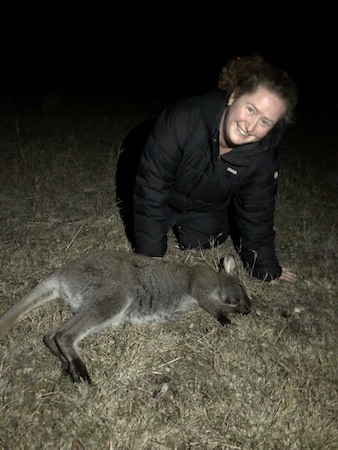
There are no guarantees when it comes to hunting. You want guarantees, go shopping! I did eventually get my first kill, but it wasn’t a beautiful trophy animal in a foreign country. It was a humble wallaby on my parents’ farm on the East Coast of Tasmania. And in some ways, that felt more honest to me, the way that hunters have been learning to hunt for thousands of years.
Start small, gain confidence and build up to the big game. Don’t rush the process. Enjoy every step along the way to success.
I’m hoping to hunt my first deer later this year, and I really don’t care whether it’s a stag or a meat doe. I just want to learn the ropes and not rush straight to the finish line.
Help us keep hunting alive
I Am Hunter has a passion to keep hunting alive. We use education and advocacy to demonstrate the positive benefits of ethical, fair-chase hunting to all society, not just hunters.
We can provide this content free to the public thanks to the generous support of our awesome members.
For less than 50c a day, members help support the fight to keep hunting alive by spreading a positive message about hunting to the wider community. In return, members get access to exclusive member rewards.
See also
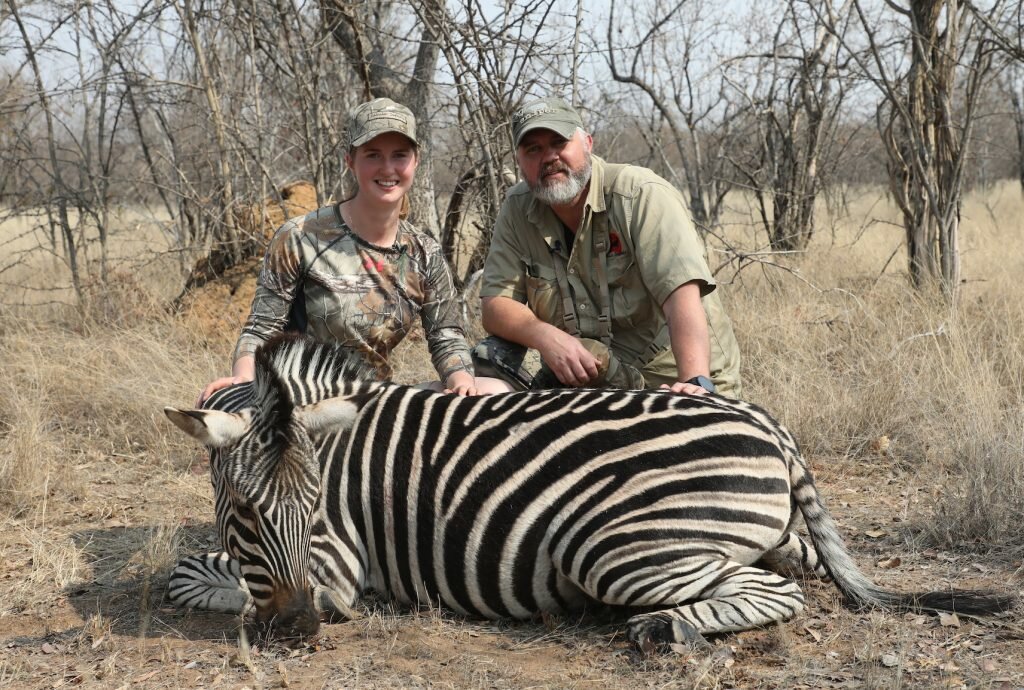
All about the stripes…What is it about hunting zebra that gets people so fired up?
I have always wanted to hunt a zebra. I’ve got no issue eating the meat and think that they make
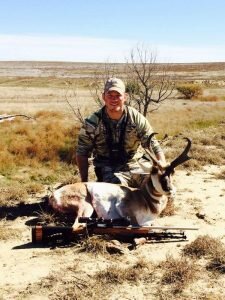
6 celebrities that hunt
From the Royal family to Hollywood actors and musical legends, there’s plenty of celebrities that hunt and enjoy hunting as much as we do.
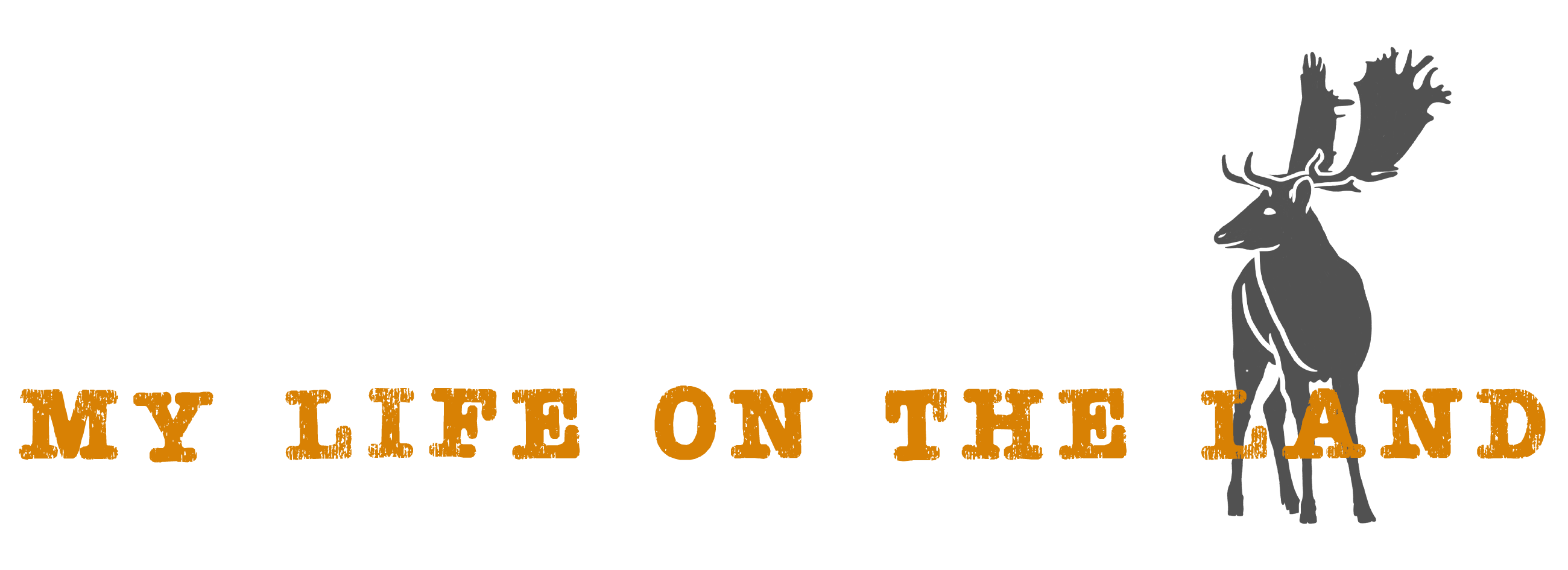
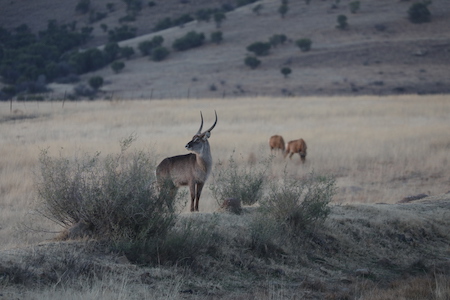
6 thoughts on “Coming home empty handed is still hunting”
Spot on Bec,
Thanks Craig. Really appreciate your feedback. As great as I think social media has been for spreading the word about hunting, I also think it’s been responsible for setting unrealistic expectations for new hunters. I’ve seen people post apologetically about the buck they took, feeling bad that he was so small! We need to get better at showing people that the true pleasure from hunting doesn’t come from the size of the antlers – or even as this article says – getting an actual kill on the ground – but the whole experience of being outdoors and experiencing nature at its finest.
Love the Empty handed article, sure it’s great to succeed on a hunt however to come home empty haded not only makes a trip where you are successfull so sweet, it also teaches new hunters that it is called hunting for a reason!